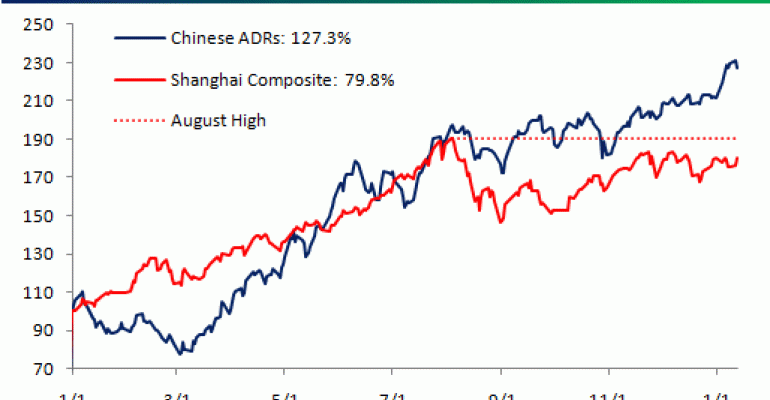China has been one of the biggest growth stories of the year for…years now. Even in 2009, a year that was buoyant for many international markets, its stock market outperformed most, with the Shanghai Composite Index rising 79.8 percent. In fact, the Chinese economy was so strong in 2009, following a highly successful government economic stimulus program, that the government is now taking measures to cool growth. There are some notable China bears out there, including short-seller Jim Chanos, but plenty of bulls too, who point to the giant and still growing middle class, with its enormous savings rate and expanding appetite for consumption.
The thing is, playing the local Chinese stock market has always been off limits to foreign investors. But it turns out that doesn’t matter much. Chinese ADRs have lately outperformed the local Shanghai Composite Index, according to Bespoke Investments, an equity research firm that has been tracking a basket of Chinese ADRs. Those Chinese ADRs shot up 127.3 percent in 2009. In fact, while the Shanghai Composite Index is still below its highs from the summer of 2008, the Bespoke basket of Chinese ADRs is currently trading right near its highest level in at least two years. We spoke to Paul Hickey, an analyst at Bespoke about Chinese ADRs and Chinese stock indices. In some ways, he says, investing in Chinese ADRs is a better bet, even, than investing in a China mutual fund.
Registered Rep.: Why are Chinese ADRs outperforming the local Chinese market?
Paul Hickey: One of the potential reasons is that generally speaking, U.S. exchanges have more stringent listing requirements. So companies that list on the U.S. exchanges may be more reputable and have tighter controls on their finances.
RR: This wasn’t always the case though, right, that the ADRs performed better?
PH: We only really started tracking it in the most recent leg up. The further you go back there weren’t as many companies listed as ADRs. It’s relatively new, in the last 5 years or so. There were some but now there are hundreds. Investors in the U.S., you typically hear that even though the Chinese companies and economy are growing, you can’t get exposure to them because the market is closed. But there are plenty of companies listed on U.S. exchanges, varying from sector to sector.
RR: Are there any downsides to investing in Chinese ADRs?
PH: Even if you’re looking at an ADR, if it is domiciled in a foreign country, then you’re subject to the rules of that country. China still is a communist country. The government can dictate the terms of business. Google is a perfect example. But even in that case, as far as China is concerned the no. 1 search engine in China is listed in the U.S. Baidu is a U.S. listed company. I don’t think it’s even listed in the Chinese markets. Its primary listing is the Nasdaq.
RR: Would there be any advantage, if it were possible, to investing directly in the Chinese market?
PH: It’s still impossible for the average investor to invest directly in the Chinese market. One primary advantage is you would have a lot more choice. Your choices are relatively limited by looking at the ADRs but there are still hundreds of choices. The major Chinese companies are listed in the U.S.
RR: Many Chinese stocks have duplicate listings on the Hong Kong exchange as well. Is this a good way to play China?
PH: A lot of the larger Chinese companies are listed in China, on the Shanghai exchange, on the Honk Kong exchange, and then as U.S. ADRs. China petroleum has several listings, and its market cap will vary according to various exchanges. While you would think they would all have the same market caps, the ADRs and the Hong Kong listed shares have historically tended to trade at a discount to local shares. The same way that U.S. investors can’t invest in China, Chinese investors can’t invest outside. So some of these stocks have higher market caps in locally listed shares.
One of the more popular ETFs is the FXI, which is the iShares China 25 index fund, that ETF doesn’t even invest in local Chinese shares, they’re all Hong Kong listed stocks. So that’s one of the ETFs people try to use for exposure, but that has underperformed the Chinese market, and our basket of U.S. ADRs. Sometimes the best course of action is to stay in the U.S. market and invest in Chinese ADRs. If you’re looking at a mutual fund, that’s someone who knows more about the Chinese market, so that could be a good move. But you could also just choose a basket of ADRs across numerous sectors so you’re not dealing with foreign listings or foreign taxes or any of that.







